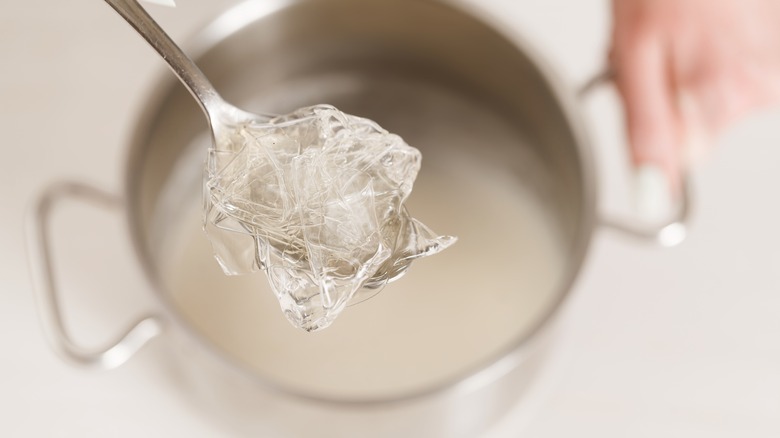If You Follow A Vegan Diet, Think Twice Before Sipping On Wine
Practicing a vegan diet has become easier in recent years. Those looking to avoid animal products can enjoy IKEA's plant-based hot dogs or indulge in tasty vegan desserts. To fully maintain a vegan lifestyle, though, one must also learn to drink vegan. Wine is fruit-based, and its labels may give the impression that the beverage inside is herbivore-friendly, so it's understandable that some don't double-check before imbibing. However, many vintners utilize animal products during the winemaking process to filter the beverage.
The process of tailoring the appearance of wine is known as fining. Vintners will use fining agents to remove anything that could discolor, create particles, or leave behind a murky film. These additions are typically taken out of the mix prior to bottling. Traditional fining agents include egg whites, milk protein, and even collagen from fish bladders — decidedly not vegan.
Not every wine undergoes the fining process, so vegan wine does exist. It's recommended to double-check winery info online before you buy, as American winemakers aren't legally required to list fining agents on bottle labels (though recent lawsuits could change that). Barnivore.com keeps an updated tally of vegan-approved wines, and PETA's website lists additional animal-friendly brands.
Animal-based products used for winemaking
The animal product used in the fining process could depend on whether we're talking about red or white wine. The production of both types employ gelatin during firing, a substance made by extracting collagen from pig or cow bones and skin. The ingredient teams up with tannins as a smoothing agent in reds and alleviates any harsh aftertaste in whites. Elsewhere, white wines also utilize a gelatin made primarily from sturgeon bladders called isinglass, which helps coax more fruit flavor out of the beverage. The ingredient can also remove hazy yeast particles from beer. Meanwhile, red wines use egg whites, or albumen, to aid in removing astringency from the drink before it's bottled.
Casein, otherwise known as milk protein, is also commonly used in fining both reds and whites. It's an emulsifier that helps soften and break down cheese, and its absence from plant-based products explains why vegan alternatives don't melt well. In fining, milk protein is an agent used to prevent excessive discoloration. All of these fining agents are effective because each is a coagulant, meaning it binds with molecules that could create a haze or undesirable color in wine, forcing the proteins to dissipate.
How to read a wine label — and tell if it's vegan
If a wine did not use fining agents for clarification, the label will include the term "unfined and unfiltered." If the beverage is labeled as "natural," minimal manipulation happened during the winemaking process (most of these options are unfiltered and unfined). Finding any of these terms on a bottle is an indicator that the chosen wine is vegan — but there's one more ingredient to double-check. Per U.S. regulations, all wines must disclose if any color additives were used on the label. Two terms used for coloring products are "cochineal extract" and "carmine." Both describe a red dye sourced from the female cochineal, an insect found in Mexico.
Beyond those disclosures, beware of tricky wine label terms. A common modern buzzword is "organic," which may lead a consumer to believe that no additives went into the wine. However, when applied to wine, the term only means that the vintner grew their grapes via USDA-certified organic processes. A variant of organic wine is biodynamic. Vintners making biodynamic drinks observe an ancient lunar calendar to determine the best days for grape harvesting, watering the crops, and other vineyard maintenance. The products are also created without overly processed additives — instead, biodynamic vintners distribute natural alternatives like manure and cow horns to develop vineyard soil. So while the finished wine may be unfined, the cultivation process is inherently non-vegan.


